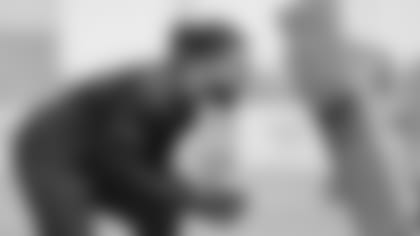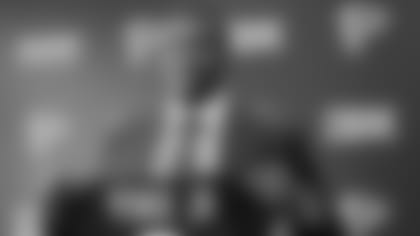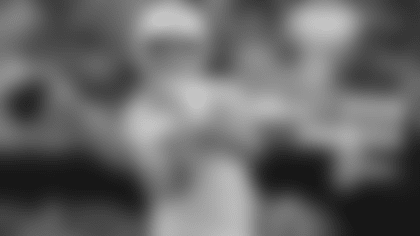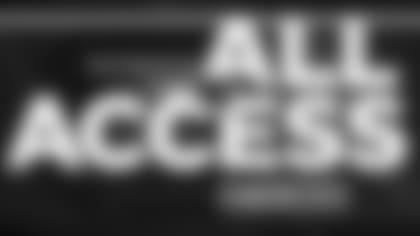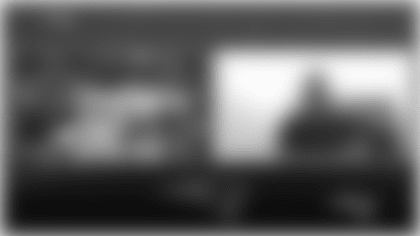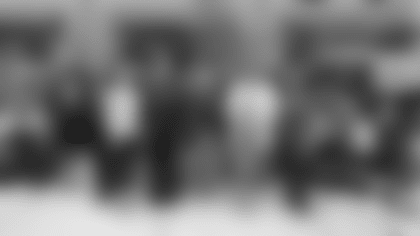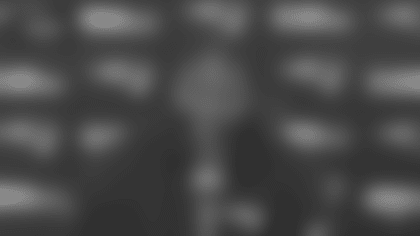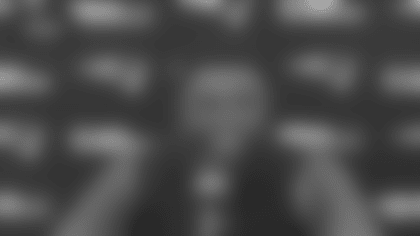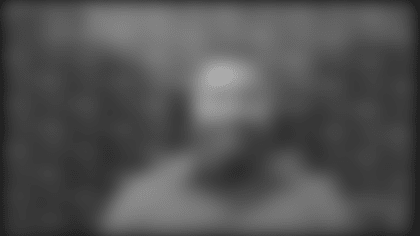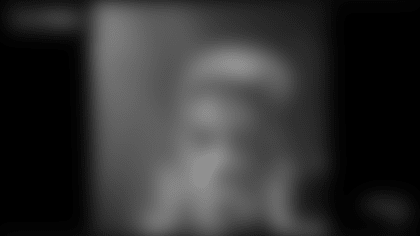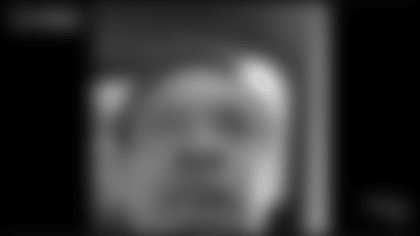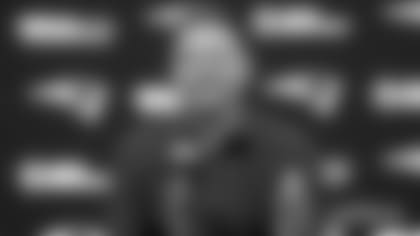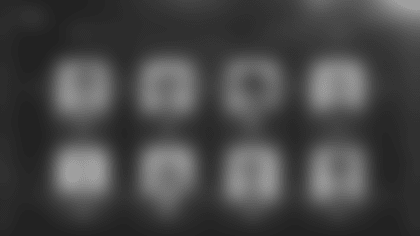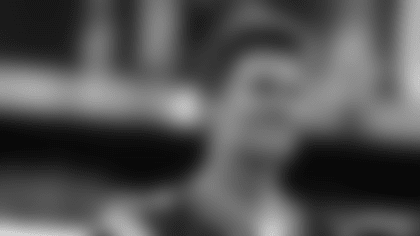Director of Player Personnel Nick Caserio
NC: Welcome back for Day 2. It's probably safe to assume we won't be picking the rest of the day, just in case anybody's wondering. We probably won't be. A busy day, a lot of movement. It really started kind of earlier in the day with the trade with San Francisco for Trent Brown, which is kind of part of the pick package here. So basically taking No. 95 and flipping that for No. 143 in the fifth round which will be tomorrow. He's been a good player for San Francisco. He played for a couple of different coaches, a couple of different systems. He played for Coach [Chip] Kelly. He started 16 games in 2016, started 10 games or whatever it was this year for Coach [Kyle] Shanahan and his staff, so he's been a good player. He has a lot of experience in the league, so it was a situation that we thought made sense for our team, so we went ahead and made the trade. And then kind of kicked the day off here, so with No. 43 and No. 63 to start the day, essentially took No. 43 and turned that into an extra fourth and a second-round pick in 2019, shuffled the deck there a few times to get to that point, and then took No. 63 to come back up there to No. 56, wherever it ended up being, to pick Duke Dawson there with our pick. Just a little bit about Duke, recruited by Coach [Will] Muschamp back when Will was the head coach there at Florida, and when you really look at the Florida defensive backfield – so at the same time that Duke was there, so [Vernon] Hargreaves, [Teez] Tabor, Quincy Wilson, Marcus Maye, Keanu Neal, which all of those guys are in the league. They're all playing. Some of them are playing a little bit more than others. He has experience essentially playing three positions. He's played safety, he's played corner, he's played slot corner, so a pretty versatile player. He played in the kicking game a little bit, so he has a lot of experience doing multiple things. We'll put him in the mix with everybody else in the secondary and see how it goes. As it currently stands, we're scheduled to pick tomorrow at pick No. 105, which is four or five there in the top of the fourth round. So No. 105, No. 143, the two sixths and the one seventh there at the end. There's still some work for us to do. We maybe picked up an extra pick or two that we didn't have. It might give us an opportunity to pick an extra player that we didn't think we were able to pick. So that's essentially where we are here for today, so we'll recalibrate. There's another - I don't know - 40 or 50 players here that'll probably be picked here over the next couple of hours. Then we'll take a look here in the morning and see what we have left and then go from there. We'll take some questions.
Q: Just for clarification purposes, is the seventh round pick No. 219 overall?
NC: I believe that's correct. I believe that's correct. I'm going off the top of my head, but I believe that's correct. Sorry.
Q: Why trade down this year for a second-round pick next year as opposed to trying to get something in this year's draft?
NC: We look at everything. We look at every scenario and that was the one we felt made the most sense, so getting extra picks for future years is something that we've done. Some years we've done it. Some years we haven't done it. I would say at the time, given the options that we had, we thought that was the best opportunity for us and made the most sense so that's why we did it.
Q: When you guys traded out of No. 51 and picked up the extra second, you essentially were out of a pick in the second round...
NC: Well, we still had No. 63, Phil [Perry]. So when we moved No. 51 with Chicago, we still had No. 63, so we still had a pick in the second round. Essentially we could've gone either way. We could've sat and picked at No. 63. We ended up moving up. If we wanted to, for whatever reason, move that back into the third round to pick an extra pick up, we could. It's a matter of supply and demand as we're looking at it. Like we talked about yesterday a little bit, trades are player driven. So when you're looking up there you're assessing the value of the player and looking at it relative to what your options may be. If you were going to pick the same player - I mean, that's a player that we theoretically were going to talk about at No. 43, so if you can get the same player at a later time and pick up an extra pick or two along the way, it makes some decent sense to do that.
Q: Did you feel like you needed to move up to take Duke Dawson because he may not be available at No. 63?
NC: I mean, look, you never know what's going to happen. But we thought, look, we like the player so instead of sitting and waiting, this is an opportunity for us that we thought made sense, so that's why we went ahead and did it just to secure the player.
Q: You've only used one pick thus far on a defensive player. Are you guys saying that you're happy with the current state of your defense? Why haven't you used more picks to help the defense?
NC: Yeah, like we talked about this last night a little bit, Ben [Volin]. Look, our goal and our job is to pick good football players regardless of what side of the ball they're on - offense, defense, special teams. So we're trying to look at the whole composition of our football team and just try to pick good players and put them in position and put them in the program and see if they can take advantage of their opportunities. So that's why we did what we did. There's never a template. You're never going in saying 'Well, we've got to do X, Y and Z.' I mean, you just take it as it comes. You look at it, you make a decision and you try to move forward. We don't look back.
Q: When you traded down today the first time, was that a reflection of the player you wanted maybe being off the board or was it a case where you felt the player you wanted could be had later in the round?
NC: Yeah, it's a combination of things. I would say there was a lot of - I mean, there was quite a bit of action on the pick. We looked at everything and thought 'Alright, well, it seems to make some sense. If we move back a few spots maybe we can get the same player or the same group of players.' You have a list of players that you feel comfortable with taking at some point, so you just try to look at everything. You just try to look at the whole picture and try to have some idea, but that was a pick that, for whatever reason, was in demand. We listened and we made the decision that we did and then we eventually ended up picking there at the bottom of the round.
Q: Did anything stand out to you as surprising in the draft tonight from a league-wide perspective?
NC: Not necessarily surprising, Chris [Price]. I think what you saw early on in the round, the offensive linemen, there was kind of a big push for that group. There must have been, off the top of my head, maybe four or five of those that went pretty quickly. And then eventually, as you got further on down in the round, the secondary, mostly corners - not so much safeties but the corner position - that was kind of the next group. It kind of went in packs a little bit, so not necessarily anything surprising but it's just kind of how they came off the board. [It was] kind of reflective of where there may have been some depth at certain positions, more positions maybe relative than others.
Q: Did you anticipate that the players would come off in packs at certain positions like that?
NC: Yeah, not necessarily. It's probably reflective of who those players were. I mean, look, every team has a different probably board and they're looking at different players. Maybe they see players a little bit differently, so maybe it's coincidence, but that group of players at those positions, where there was a decent amount of depth, those players started to come off.
Q: Tennessee jumped ahead of you for the second time in this draft tonight. Is there any significance to that?
NC: Maybe Karen [Guregian] can talk to Mike [Vrabel] about that, I don't know. But, no, no significance at all. I mean, every team is just moving up and down. Jon [Robinson] and Mike do what's best for their football team, and we try to do what's best for our football team. So, we've got a lot of respect for Jon and Mike and what they do. I mean, they've done a great job, so hats off to them.
Q: When you were trading No. 43 into various other picks, how much discussion was there of trying to make it tough on us to analyze the Jimmy Garoppolo trade?
NC: Yeah, you guys will parse that tomorrow, so that's not our job. We're just looking at the picks, looking at numbers, and when the trades come into play, we'll take it as it comes.
Q: What kind of flexibility does the volume at the back end of the draft give you now that you have a handful of picks in later rounds?
NC: Sure, it just gives you an opportunity to pick maybe a few players that you like or that maybe you would have to compete for in rookie free agency. So, instead of having to compete with them in free agency, maybe you'd just pick the player to avoid that and/or if you wanted to move a little bit in the fourth and fifth round - I think we ended up doing that last year like we did with Conor McDermott. You know, we had two sixths. I think we took two sixths and went up into the fifth. So, if you're looking up there and there's a specific player that you have interest in and you're sitting there going, 'Well, he might not make it here to the sixth or seventh round.' Like, if we like the player enough, alright, let's go up there and get him and pick the player. Maybe he has a definitive role. I mean, some of the players that we've picked historically - like Matthew Slater I think was a fifth-round pick, Joe Cardona was kind of somewhere in the fifth or sixth round. So, there's some players that may have a specific role or have an opportunity to make your team or make your roster, and then there's some other players that maybe you want to work with, you want to get them in your program, so this gives you an opportunity to potentially do that.
Q: When it comes to those sixth and seventh round guys, do you ever have conversations about drafting them versus waiting on them as undrafted free agents?
NC: As far as actually not picking them and then waiting?
Q: Right, choosing not to draft them and waiting until free agency.
NC: Yeah, it changes every year. I mean, if the player you can potentially use the picks to move is a little bit better player or has a little more value as opposed to waiting to take a player that maybe is a little bit further on down the line, he's going to be more of a free agent, so there's no specific formula, no specific need. Like we talked about with McDermott, OK, we're looking at how many draftable players that we felt we could take. So instead of waiting for the sixth, 'Well, is he going to be there? Well, we're not sure. Well, let's just take those picks and just move up there and get him.' So, I mean, volume, numbers just give you more opportunity and flexibility if you want to use it. I mean, look, those five could very easily go to two in a heartbeat or depending on how it unfolds.
Q: A couple players on the defensive side of the ball lost their rookie seasons due to injury last year. Do you factor those guys in as part of this draft class?
NC: It's a good question, Bob [Socci]. They lost a year, but they didn't lose a year because of other aspects of the program that they've been immersed in. So, not necessarily on the field in terms of their football development, but there's other areas – classroom development, individual development, strength development. In the case of players like [Derek] Rivers, once he gets to a certain point, then he can start his strength training so he can start to recuperate his strength, his speed, his explosiveness. He can't necessarily do things football related on the field in terms of practice, but there's some other things that you can do. So, it's not necessarily a lost year, but that's a player that he's essentially starting over to some degree, a little bit like James White. I mean, not like he was injured, but I mean, James White was practically inactive for his first year, and Shane Vereen kind of went through the same kind of thing. Those guys essentially didn't play their first few years, so it's never a lost year. I mean, there's so many things that they can get involved in, that they can be a part of, that they can improve their overall skill level, they can work on individually, they can still sit in meetings, they can still work with their coach, so it's just an opportunity. Look, it's up to them to take advantage of the opportunity. They can use their time wisely, and some take advantage of that, others don't. I mean, they're rookies, but they're not rookies because they're a little bit more experienced. But, they haven't been able to develop their skills on the field, so they're essentially like some of these guys who haven't really developed their skills in our program.
Q: In scouting Dawson, did you find him to be comfortable inside or outside?
NC: He's played everywhere, honestly. He's played anywhere from safety, slot corner, he's played perimeter corner. You can see him actually against good people at all those spots so what's the best position [for him]? We'll see. I mean, Devin [McCourty] played corner his first year and he went to the Pro Bowl as a corner. Now, he's been one of our most dependable players as a free safety for however many years as he's been here. So how's that going to go? We'll see. I'd say, it's not like the offensive line, but similar in that we're trying to get as many of our best people out there and we'll allocate him accordingly positionaly. Maybe it's package based. Maybe it's week-to-week based on who we're playing. [Patrick] Chung played safety at Oregon. He really didn't play in the slot, but now Patrick has played as much in the slot or as close to the line of scrimmage as any of our players and he's been as good as any player we've had or throughout the league in that role. So he has experience in all those spots. What's his best position? I don't know. His performance will determine what his role is and what his best position is for him within the composition of the entire defense.
Q: Dawson was one of the players that came here during a visit. During the evaluation process, what stood out about Dawson?
NC: I'd say his competitiveness, his tackling, his versatility, the fact he played so many spots. It's in a situation like that, let's say you have a secondary player or a corner that plays on the perimeter and maybe you're trying to project a little bit inside of the slot position, but you've never seen him do it, but maybe his skills are conducive to playing inside, but in the case of somebody like Dawson, you've actually seen him play in there, so maybe that's a role he could fill or maybe there's another position for him. But I'd say his versatility, his tackling, his overall competiveness and his toughness and the fact that he played with a lot of good people around him. His freshman year, he was in the mix with some other good players, so that's a pretty good sign. How that translates into our system? Obviously, they're starting from scratch, so we're going to take inventory on where he is, but he's an impressive kid. He's a really tough kid and he's a really competitive kid. And I'd say that shows up in his play and also when you have an interaction with him one-on-one.
Q: Trent Brown mostly played on the right side, but do you project him as a left tackle in the NFL?
NC: A tackle is a tackle. I mean, some may be better on the left than they are on the right. We've had guys play on the right that have also played on the left. Sebastian Vollmer played left tackle at [the University of] Houston and we got him and he was our starting right tackle. Then we lost Nate [Solder] and he went over there and played left tackle. So, a tackle is a tackle. Maybe one position or one side is better for the player than the other, but we're not going to make a determination on that right now. Once he gets here, once he gets in our program, once he starts working with [offensive line coach] Dante [Scarnecchia] and the offensive staff, then we'll figure out where he fits relative to the rest of our players.
Q: Is the approach to add as much competition to that position as possible?
NC: That's probably more of a team-wide philosophy. Our goal and our job is to try to create as much competition across as many position as possible. It comes in many shapes and sizes and forms and it comes at different times of the year – March free agency, draft now, undrafted free agency, they'll be some things that probably happen over the course of the summer, and then once we get into training camp, it's going to be a whole other group of players. It's like we talked about a little bit last night, it's a very fluid process, it's on-going. It's continuous. We have some flexibility in terms of the roster. We have the space to do it, so our goal and our job is to create as much competition on this football team as possible, and then let the competition play itself out. So when a player gets here, what's his role? I don't know. It's how well he does his job and how well he performs in that role that will ultimately determine who sticks around and who fits and what they end up doing.
Q: Duke didn't really start until this past year, but he got a lot of playing time. At what point did you really start to zero in on him?
NC: This was a player who actually thought about declaring as an underclassmen last year, so we've been tracking him or doing work on him for the past few years. He may not have started but he's played a lot of football. Like you said, he was a third corner or the third safety. You talk about [Vernon] Hargreaves or [Teez] Tabor or Quincy Wilson. He was in the mix and he was competitive with that group. This guy has played a lot of football against a lot of good people and in a good program. So on paper he may have started X amount of games, but he's played a lot of football and you can see that on a weekly basis.








